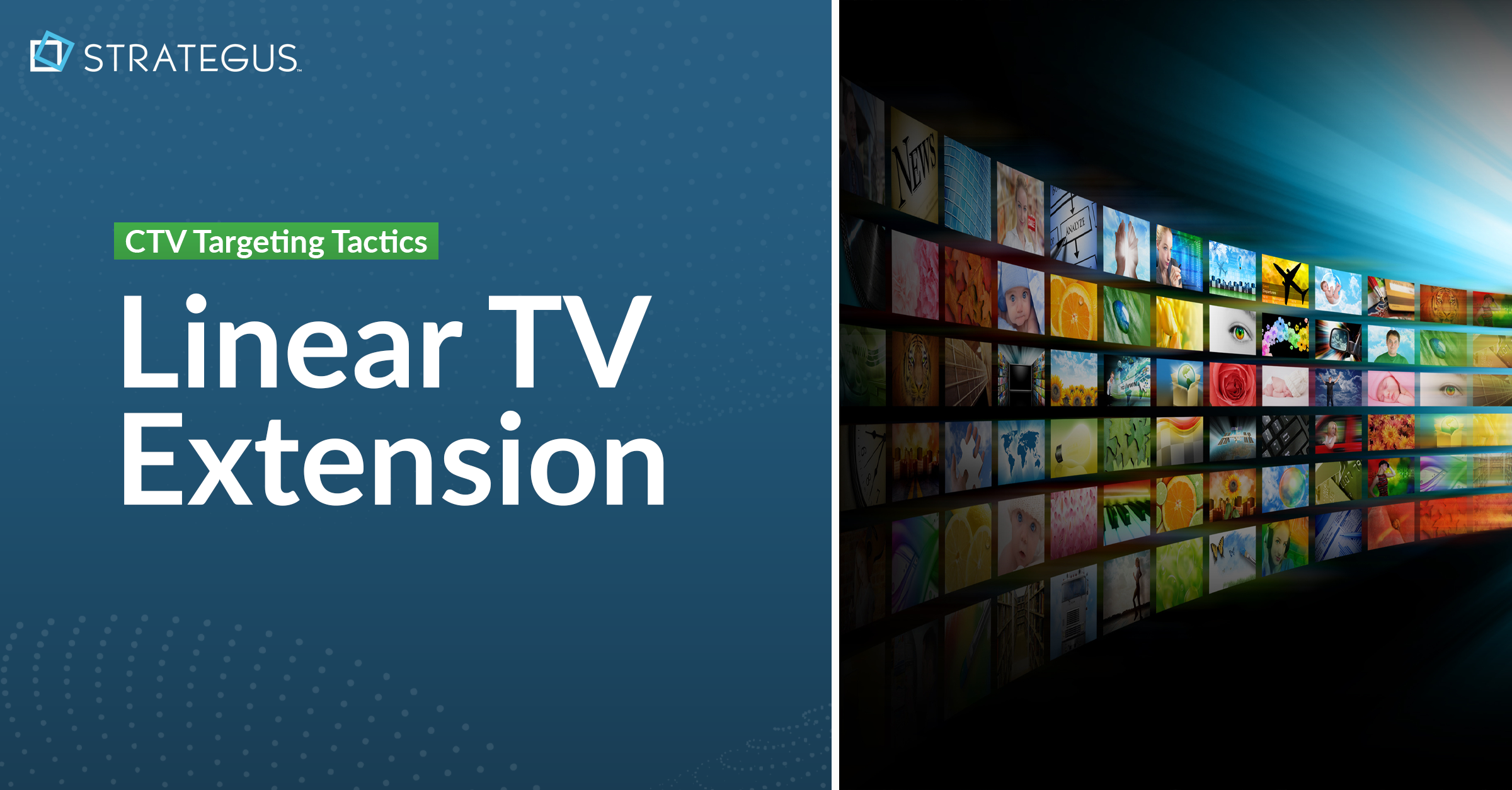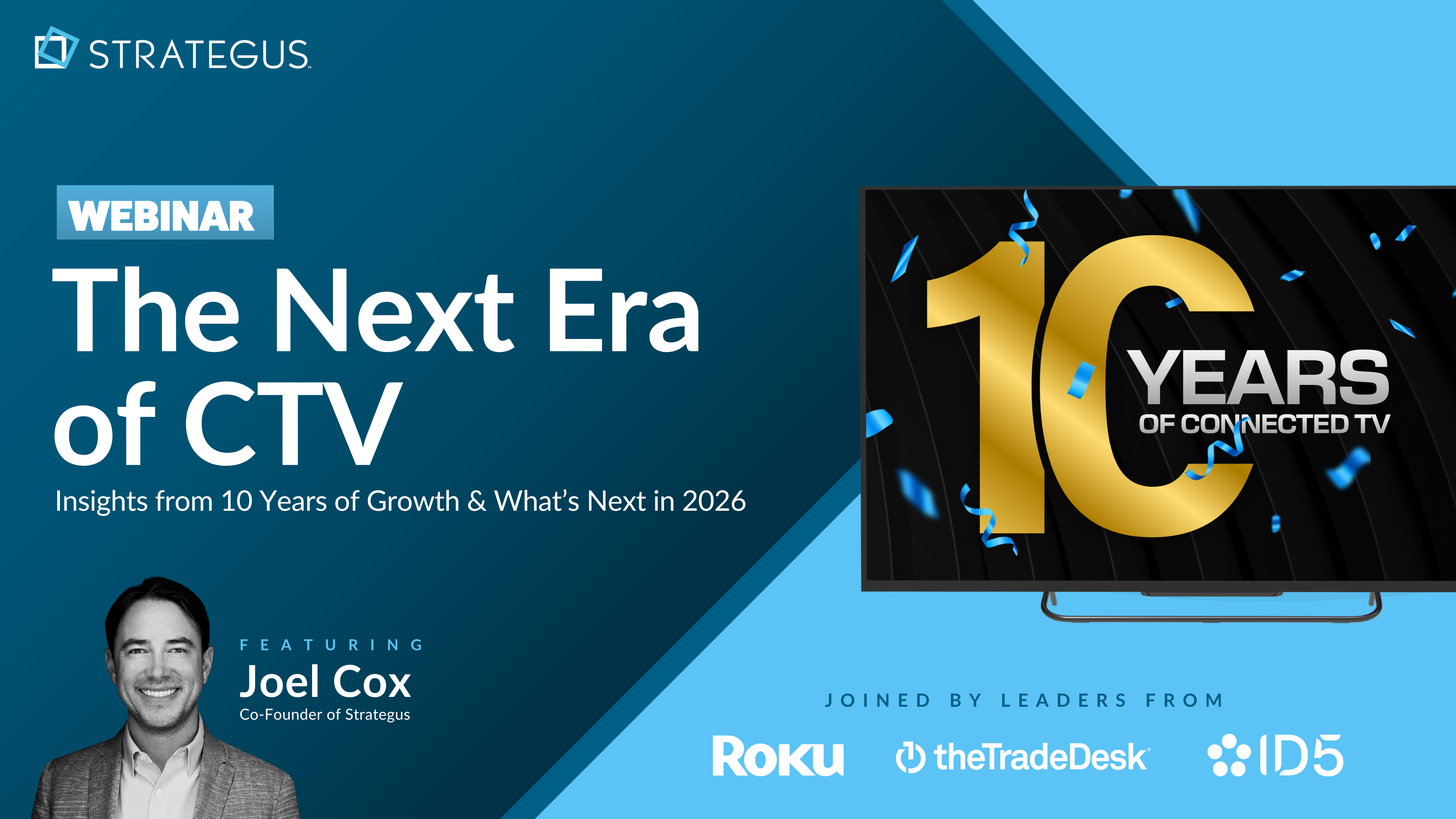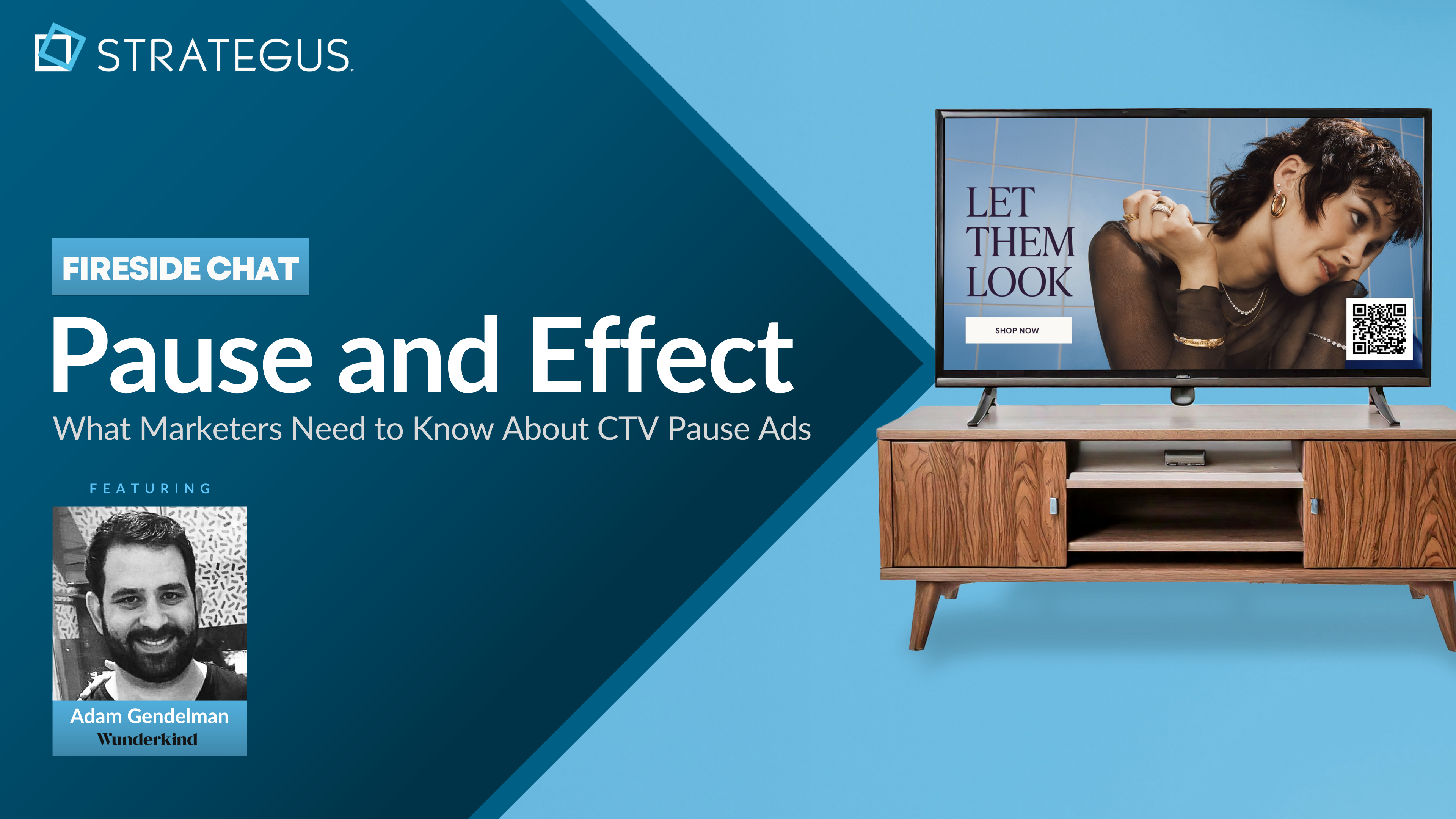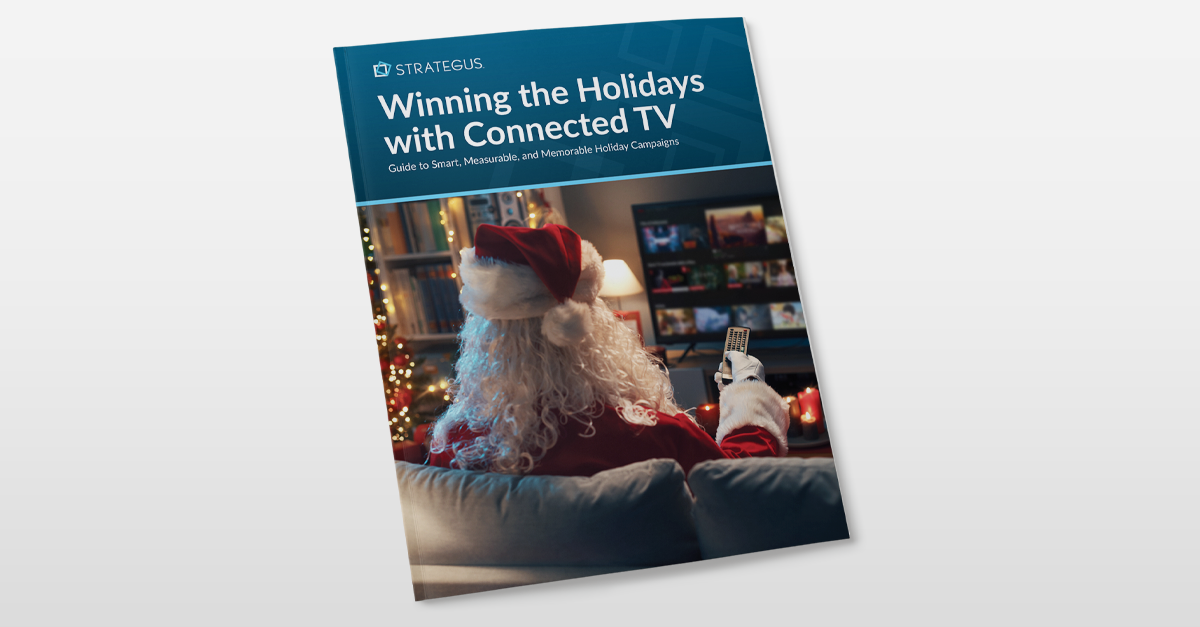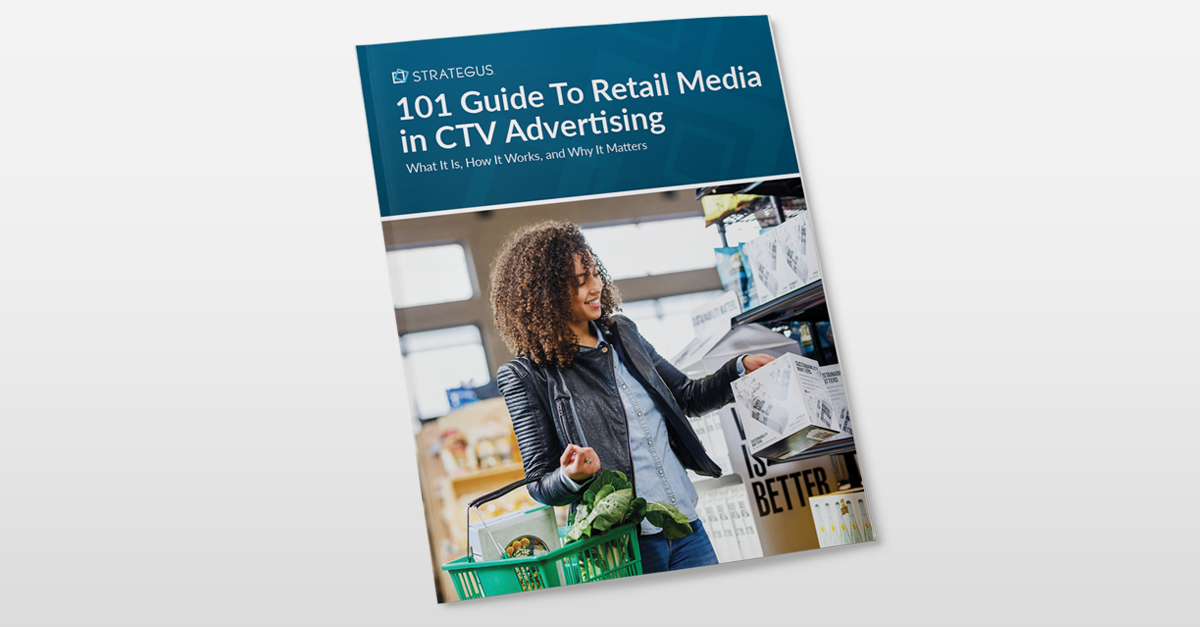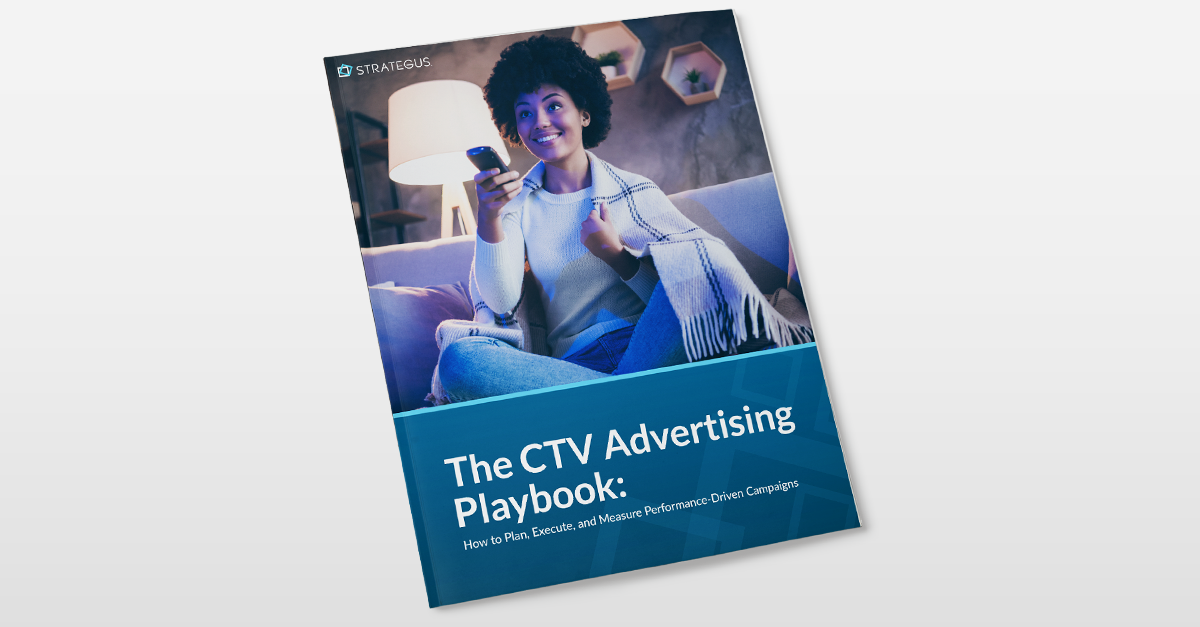- Home
- Strategus Blog
- Interactive Video Ads: Best CTV Formats for Driving Engagement
Interactive Video Ads: Best CTV Formats for Driving Engagement
 Traci Ruether
Traci Ruether
16 minutes read
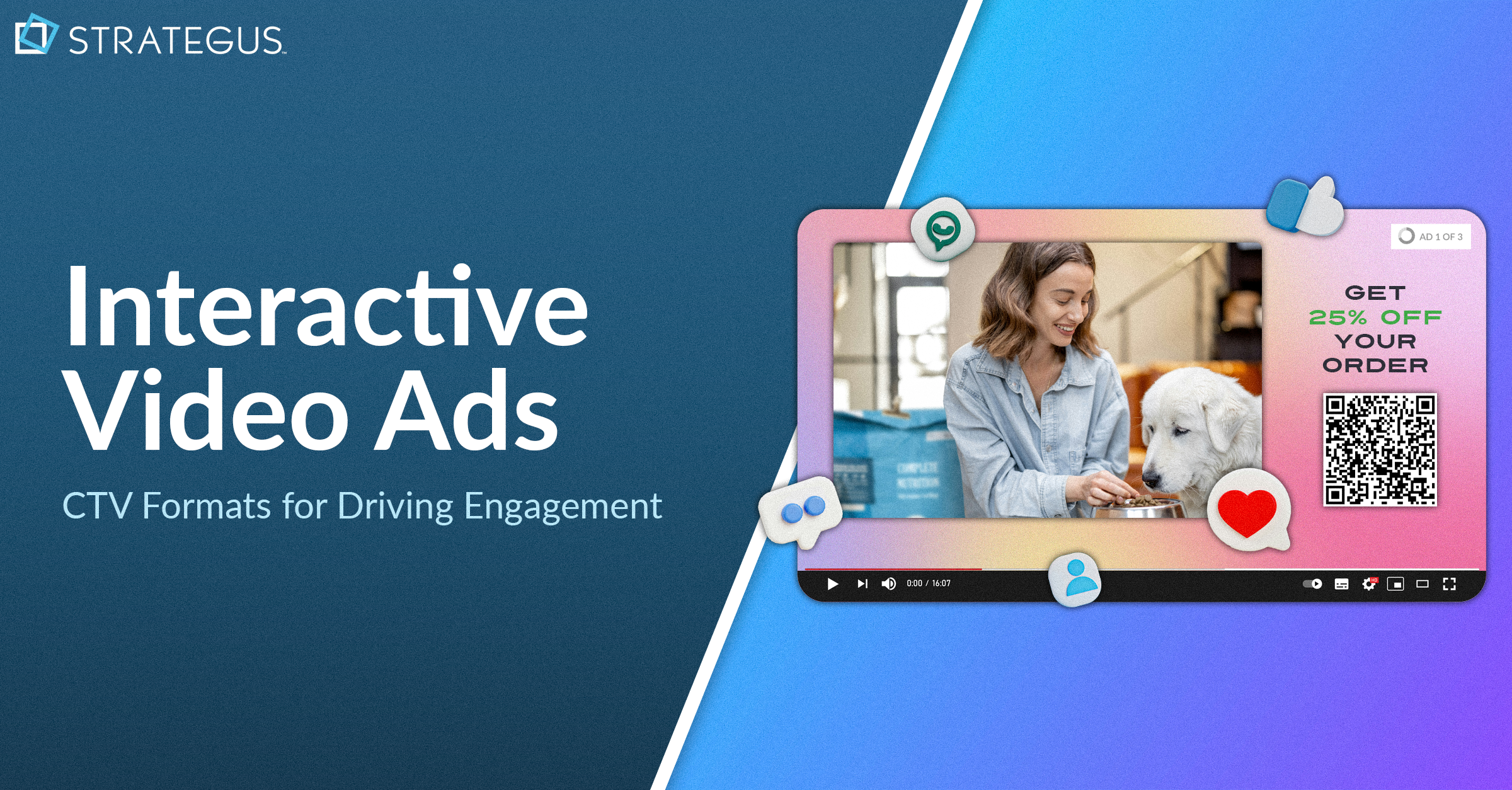
You’ve probably zoned out during a TV ad, but what if the ad lets you choose what happens next?
That’s the power of interactive video ads.
In this guide, we’ll break down the best CTV ad formats with real examples that show how interactivity drives attention, action, and ROI.
What are Interactive CTV Ads
Interactive CTV ads are connected TV advertisements that let viewers actively engage with the ad content using their remote control or smart device.
Instead of just watching, users can click, scroll, or select options, like requesting more info, answering a poll, or locating a nearby store.
These ads boost engagement, track viewer actions, and offer brands better insights and conversion opportunities compared to passive TV ads.
5 Reasons To Invest in Interactive Video Ads
Interactive CTV isn't just about driving immediate conversions (though it excels at that). It's also a powerful tool for boosting brand awareness, gathering audience insights, and fostering a deeper connection with viewers.
Here are the 5 main benefits for interactive video ads:
Capturing attention in a cluttered advertising landscape.
Quicker progression down the sales funnel through direct engagement.
Gathering valuable customer insights through interactive elements.
Boosting brand awareness and fostering stronger connections with viewers.
Improved ad recall through a more memorable ad experience.
This data can then be used to create detailed buyer profiles and personalize ad campaigns to different segments.
Best Interactive Video CTV Ad Formats
Here’s an overview of the best ad formats for interactive video CTV:
- QR Codes
- Dynamic Overlays
- Countdown Overlay
- Weather Overlay
- Sports Ticker
- Social CTV
- Clickable Formats
- Store Locators
- Galleries and Carousels
- Choose-Your-Own Commercial
- Submit Contact Info
- Gamification
- Surveys
- Trivia and Quizzes
- Games
Now, let’s take a look at the best interactive video CTV ad formats and examples in detail:
1. QR Codes
When most people think of interactive CTV, they immediately picture a QR code. It all started a couple of years ago at the 2022 Super Bowl, when Coinbase debuted the first major QR code commercial.
Source: Branch
The groundbreaking ad was objectively a bore: it featured a slowly bouncing QR code for a full 60 seconds. Despite this, engagement was so high that the campaign crashed the Coinbase app thanks to the 20 million plus people who jumped up to scan their screen.
This was a pivotal moment in advertising because it proved beyond any doubt that TV advertising didn’t have to be approached as a passive medium. Rather, interactive formats could drive immediate action, even with seemingly simplistic creative.
The Coinbase ad wasn't just a commercial; it was a call to action that viewers couldn't ignore, setting a new standard for engagement in the CTV era.
Today, QR codes abound. And while it’s doubtful that another QR code campaign will ever see the same success that Coinbase did, there are still several benefits to this tactic.
Specifically:
- QR codes make TV commercials clickable.
- They engage viewers across multiple screens and devices.
- They provide transparency and measurability to advertisers.
That said, a commercial has to be super compelling to prompt someone to reach into their pocket and scan a code during a 30-second ad break. This was likely a reason why Coinbase went with the full 60-seconds spot and such a bare-bones approach.
But advertisers are solving for this by adding dynamic overlays that catch viewers’ attention and showcase the QR code.
2. Dynamic Overlays
Dynamic overlays add a layer of visual appeal and real-time relevance to CTV ads. While they aren’t inherently interactive, when paired with a QR code, they become a powerful tool for driving viewer engagement.
These overlays can take a few different forms, so let’s get into each type.
a. Countdown Overlay
For anything constrained to a set amount of time, such as a product launch, short-term promo, or upcoming release, countdown timers help capture the urgency in a palpable way.
Say a furniture store was running a Labor Day sale event, and they’d built a custom landing page with all of the details. Pairing this type of overlay with a QR code would be a perfect fit, prompting viewers to take action before time runs out.
Viewers are 43% more likely to remember the promotion start date with a countdown overlay.
b. Weather Overlay
Who doesn’t like helpful and personalized information? Weather overlays deliver just that, tailoring more generic CTV ads to a viewer’s local weather conditions.
This approach works best when the forecast supplements your message — such as when an ad for sunscreen plays on a scorching summer day or a beachy destination fills the screen during the thick of winter.
Consumers are 53% more likely to pay attention to ads with useful information
c. Sports Ticker
Let’s face it: Sports fans don’t love commercial breaks. But what if the ads could provide real-time updates and scores from games?
Sub in sports tickers.
Sports tickers keep viewers' eyes glued to the screen by sharing the latest scores and schedules of local football, basketball, baseball, hockey, golf, and soccer games.
Attention-catching? Check.
Relevant and personalized? Check. Check.
Positive brand associations? Check. Check. Check.
Fans are 91% more attentive to ads with sports tickers
d. Social CTV
Vertical video formats, user-generated content (UGC), and interactive elements like emojis and comments dominate social media. Consumers are accustomed to these formats, so why not bring them to the big screen?
Social CTV does just that.
Social CTV ads are TV ads created from social media posts. They can be made quickly and easily and cost less than traditional TV ads. This format also helps increase brand awareness and engagement.
Some of the benefits of using social CTV creative ads include:
Quick and easy to make.
- Lower production costs than traditional TV ads.
- Increase brand awareness through authentic messaging.
- Increase engagement by pulling updated social metadata (like, comment, and view counts)
And like the other formats in this section, social video ads can be paired with QR codes to seamlessly link TV and online touchpoints.
3. Clickable Formats
While QR codes and dynamic overlays bridge the gap between CTV and mobile devices, they still ask users to grab their smartphones and scan the screen rather than offering a truly native method of engagement.
With clickable formats, viewers can interact directly with the ad using their remote control – no smartphone required. This eliminates the friction of switching devices and creates a more immersive experience, keeping viewers fully engaged with the big-screen TV.
Clickable formats come in several flavors, including store locators, galleries, and carousels, the ability to choose your own commercial, and on-screen contact info submission.
a. Store Locators
Imagine a pizza franchise that wanted to personalize ads to different viewers by instantly displaying the nearest location. That’s the power of store locator ads.
This format uses the viewer’s location data to dynamically highlight nearby stores, seamlessly integrating on-screen and offline touchpoints. This enables viewers to progress down the buyer’s journey in real time, locating your business without any effort.
Store locators deliver a level of personalization and relevance that's hard to beat. Beyond just highlighting the closest location, they also give viewers the ability to scroll through multiple other locations, further driving foot traffic.
b. Galleries and Carousels
Galleries and carousels offer viewers a visually rich and interactive way to explore additional content without leaving the comfort of their CTV screen. By showcasing a collection of images, videos, or products, these formats provide an immersive experience that encourages viewers to delve deeper into your offerings.
Some examples include:
- Photos: Showcase stunning visuals of your products, destinations, or brand stories, allowing viewers to browse at their own pace.
- Video galleries: Highlight multiple video clips, testimonials, or product demonstrations, offering a more dynamic and engaging experience.
- Product carousels: Feature a rotating selection of products, complete with details and pricing, enabling viewers to explore your offerings and make informed decisions.
These formats are particularly effective for industries with extensive product lines, visually appealing content, or complex offerings that require more in-depth exploration. They transform your CTV ad into a mini-showcase, giving viewers the freedom to discover what piques their interest and learn more about what you have to offer.
c. Choose-Your-Own Commercial
Remember those "Choose Your Own Adventure" books where you could decide the fate of the story? Choose-your-own commercial ads bring that same interactive storytelling to the world of CTV advertising. By letting viewers select which ad they watch, this format puts viewers in the driver's seat.
It works like this: During a commercial break, viewers are presented with an ad selection screen with 2-3 options, each representing a different storyline or product focus. Viewers then use their remote to select the ad that piques their interest most. If no selection is made within 15 seconds, the currently highlighted option (typically the first spot) will play automatically.
d. Submit Contact Info
Want an alternative to giving users a QR code that brings them to a contact form? With the submit contact info format, viewers can opt into a campaign or request further information using only the remote.
This format uses a clear CTA like "send me a coupon" or "request a quote," followed by a prompt to enter their phone number or email address. The benefits are twofold:
- Immediate opt-in: Viewers can express their interest instantly, eliminating the need for them to remember to follow up later.
- First-party data collection: Advertisers gain valuable contact information, building their audience list and enabling future targeted marketing efforts.
This frictionless approach to lead generation not only boosts engagement but also empowers you to nurture those warm leads and convert them into loyal customers down the line. It's a win-win for viewers and advertisers.
4. Gamification
Looking to drive brand awareness with high-engaging experiences? Gamification injects a playful element, captivating viewers with quizzes, surveys, and mini-games.
a. Surveys
Want to gain insight into your audience's preferences and opinions? Surveys make it easy.
Check out this example from Loreal, which lets users self-identify their skin concerns and then provides a relevant QR code based on their selection. This doesn’t just help advertisers gather real-time data, it also enables the user to opt into a more relevant campaign based on personal needs.
And surveys don’t have to use a QR code. They can also be used to give viewers a feedback channel. For instance, an insurance company might use a survey overlay to gauge customer satisfaction or gather insights on their Net Promoter Score (NPS).
Regardless of how the survey is configured, this format a direct line of communication with your audience, providing invaluable data that can inform your marketing strategies and drive future success.
b. Trivia and Quizzes
Much like surveys, trivia ads present multiple-choice questions for viewers to interact with. The content can be crafted to highlight brand differentiators while tapping into people's competitive nature.
For instance, a cosmetics brand might ask when sunscreen was invented. Or, a car dealership could quiz viewers on the difference between four-wheel drive vs. all-wheel drive.
The purpose of this format is to pique viewers’ interest with a fun brain teaser. Rather than driving conversions, trivia ads are more about standing out during the commercial break by creating a memorable experience.
c. Games
Last but not least, we have good old games. These provide a unique and interactive way for viewers to connect with your brand during the ad break, taking your ads to the next level.
Imagine a quick puzzle, memory match, or game of change. The possibilities are endless. And the reward? Heightened engagement and brand recall.
Other Ways to Engage Viewers and Drive Campaign Performance
1. Multi-Channel Campaigns Using Cross-Device Retargeting
Instead of relying only on QR codes, advertisers can use clickable ads (like display banners) to reach people who already saw their CTV ad. This is called cross-device retargeting, and it helps you stay in front of the same audience across multiple platforms.
For example, a law firm might run an ad on a smart TV, then follow the same viewers with ads on Pandora, Instagram, and YouTube.
The exact mix of channels will depend on your business, but the goal is always the same: guide potential customers through the buying journey with a smooth, connected experience.
Here’s how a multi-channel CTV campaign might look:
|
Stage |
Channels and Approach |
|
Awareness |
|
|
Consideration |
|
|
Conversion |
|
At Strategus, we take a unique approach to CTV retargeting that combines big-screen ads with omnichannel strategies across the programmatic ecosystem. Not only does this ensure a consistent experience for consumers, it can also increase conversion by more than 200%.
2. Sequential Storytelling
Sequential CTV creatives allow you to tell a story that unfolds across multiple ads, rather than cramming everything into one. The sequence can even be personalized based on viewer interaction.
For example, viewers who complete a CTA in ad A might receive a tailored follow-up message with ad B, while those who don't complete the CTA will be served ad C. This approach fosters deeper engagement with your brand story, keeping viewers intrigued by tailoring the sequence to their journey.
3. Ad Personalization
Rather than making viewers select which ad experience is the most relevant to them, why not do it for them?
Given the advanced targeting capabilities of CTV, you should already have your campaigns segmented to different buyers. From there, adapting the creative to resonate with each individual shouldn’t be that big of a lift. Capabilities like dynamic creative and social media repurposing can help you quickly iterate using existing assets, both of which Strategus supports.
What would this look like? Say a Colorado Travel company identified three key customer segments: ski and snowboard enthusiasts, outdoor adventurers, and luxury travelers.
The ad creative could be planned as follows:
1. Ski and Snowboard Enthusiasts
This ad would showcase the most well-known ski resorts, clips of downhill action, and highlight an early bird promo for the winter season.
2. Outdoor Adventurers
This ad might showcase breathtaking hikes, pristine lakes, and idyllic camping locations.
3. Luxury Seekers
For this segment, the creative would showcase a spa nestled in the mountains, gourmet dining experiences, five-star hotels, and exclusive VIP deals.
Maximize Your CTV Impact with Interactive Video Ads With Strategus
Connected TV (CTV) advertising is a powerful tool for agencies and brands looking to move beyond broad awareness with more results-driven campaigns. But this requires taking a different approach than you would to traditional TV commercials.
At Strategus, we support all of the formats detailed above and approach each CTV campaign holistically by designing a full-funnel strategy.
Want to learn more about how our team of experts will work with you to develop a conversion-focused strategy tailored to your needs?
Frequently Asked Questions
How Much Does It Cost to Advertise on CTV?
CTV ad costs typically range from $25 to $60 CPM depending on the platform, targeting precision, and inventory type. Premium placements on apps like Hulu or Peacock cost more, while programmatic options offer better efficiency. Cost also varies based on campaign goals and duration.
How to Advertise on CTV?
To advertise on CTV, you can either use a demand-side platform like The Trade Desk or work with a managed service provider. Upload your creative, set targeting parameters like location or interests, define your bid strategy, and launch across platforms like Roku, Fire TV, or smart TVs.
How to Make Interactive Ads?
Start by choosing a platform that supports interactive elements—like Innovid, BrightLine, or LG Ads. Then define your CTA, such as scanning a QR code, answering a poll, or playing a game. Keep the interface simple, optimize for remote navigation, and test for seamless interaction.
What Is Ad Recall Lift?
Ad recall lift is the measured increase in how many people remember your ad after being exposed to it, compared to those who weren't. It's typically calculated through surveys and is used to assess how memorable or effective an ad was in building brand awareness.
What Is Interactive Advertising?
Interactive advertising refers to ad formats that let users engage in real time—by clicking, voting, swiping, or submitting info. This approach creates a two-way experience, making the ad more memorable and actionable while allowing brands to gather behavioral and intent-based data.
How Can I Create a Video Ad That Is Interactive?
You'll need a creative platform that supports interactive layers, such as VDX.tv or BrightLine. Add components like clickable overlays, store locators, or dynamic carousels. Tailor your call-to-action, test the experience on CTV devices, and align visuals with user flow for higher engagement.
Who Leads in Shoppable and Interactive TV Formats?
Amazon, Roku, and Samsung Ads are key players in shoppable and interactive CTV. Amazon integrates product buying with Fire TV. Roku offers native interactive formats with clickable CTAs. Tech enablers like Innovid and BrightLine help agencies run custom interactive campaigns at scale.
How Mobile CTV Ads Are More Impactful for Advertisers?
Mobile CTV ads enhance campaign performance by bridging the second screen. When paired with retargeting, they reinforce brand messaging across touchpoints. Users can immediately act on mobile, making it easier to measure conversions and drive action after initial exposure on a TV screen.
What Are the Best Ad Formats to Promote Sports Offers in 2024?
Formats like sports tickers, countdown timers, and dynamic overlays are best for promoting sports-related offers. They provide live updates, build urgency, and keep viewers engaged. Pairing these with QR codes or clickable formats helps convert attention into immediate action or ticket sales.
What Are Interactive Ads, and How Do They Engage Users?
Interactive ads engage users by inviting them to participate via quizzes, polls, carousels, or choose-your-own-experience formats. This active involvement increases dwell time, strengthens message recall, and gives brands access to more data on viewer preferences and intent than passive ad formats do.

Traci Ruether is a content marketing consultant specializing in video tech. With over a decade of experience leading content strategy, she takes a metrics-driven approach to storytelling that drives traffic to her clients' websites. Follow her on LinkedIn at linkedin.com/in/traci-ruether or learn more at traciruether.com.
Strategus is a managed services connected TV(CTV) advertising agency with over 60,000+ campaigns delivered. Find out how our experts can extend your team and drive the result that matter most.
Talk to an Expert
Table of Contents
Seeking a Custom CTV Strategy That Delivers?
What to read next

How Auto Dealers Can Build a Winning First-Party Data Strategy
Your Dealership’s Data is More Powerful Than You Think
4 minutes read

Linear TV Extension (LTVE): When to Use It With CTV
Linear TV still delivers scale. It still anchors major brand moments. And for many advertisers, it still represents one of the largest line items in...
6 minutes read
App Event Tracking: Tie Mobile App Activity to CTV Campaigns
Let’s say you’re running a CTV campaign for a personal finance app.
5 minutes read

Stop Guessing Who Your Audience Is — Let Their Apps Tell You
Connected TV (CTV) targeting often falls in one of two camps.
8 minutes read




